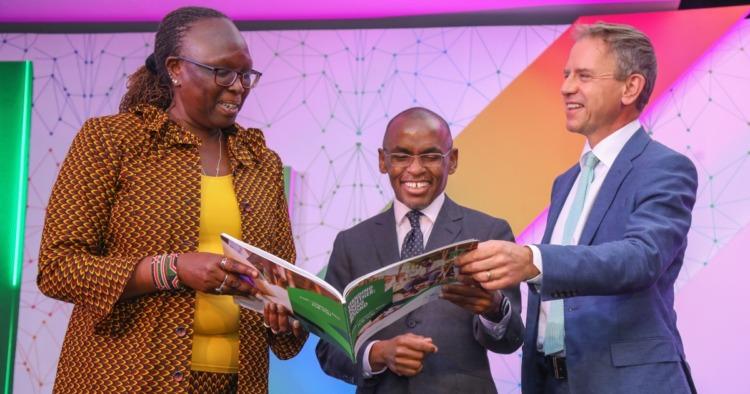- The telco sustained 190,273 direct and indirect jobs during the year
- Safaricom registered its first decline in full year profit in nine years, in the year ended March 2021
- The report seeks to illustrate how Safaricom is using a sustainable business model to address society’s needs
Safaricom’s latest sustainable business report indicates that the company created a total value of Sh664 billion for the Kenyan society in the 2020/2021 financial year, which is ten times greater than the profit made during the year.
According to the report’s ‘True Earnings’ highlights, the firm contributed Sh557.1 billion to the economy in the financial year, which is 5.2% of Kenya’s Gross Domestic Product (GDP).
The independent analysis of Safaricom’s true value to society identifies the socio-economic and environmental impacts of the company and quantifies them in financial terms.
“Our Sustainable Business report, which covers our last fiscal year from 1st April 2020 to 31st March 2021, discloses our efforts to achieve our purpose of transforming lives by transparently showing our successes, setbacks and future focus areas, all of which are important to our business and of interest to our stakeholders,” said Michael Joseph, Chairman, Safaricom.
The report also details how the telco sustained 190,273 direct and indirect jobs during the year and, if the wider effects on the economy are included, this number increases to over 1 million jobs.
Key among the environmental highlights of the report is the introduction of science-based carbon reduction targets which the company says will help them plan their progress towards becoming a net-zero carbon-emitting company by the year 2050.
According to the report, Safaricom has planted over 650,000 trees under its carbon offset tree growing initiative.
This is part of the company’s commitment to grow 5 million trees in five years which it estimates will offset 26% of its emissions.
Safaricom has been documenting its sustainability journey since 2012 and in 2016 it integrated 9 of the17 Sustainable Development Goals (SDGs) into its business strategy.
Looking ahead Safaricom says it will continue to provide solutions to society’s most pressing challenges and support other businesses, especially small and medium enterprises to thrive through connectivity and financial services solutions.
“Going forward we will also endeavor to play a key role in driving healthcare and education inclusion as well as enabling smallholder farmers to become wealthier and commercially sustainable. We will also continue to integrate our 9 material SDGs, directly linked to our business growth strategy and which have enabled us to become a more sustainable company and create meaningful impact on communities that we serve”, said Peter Ndegwa, CEO, Safaricom.
The 10th annual report, whose theme is “Standing Together; Going Beyond”, seeks to illustrate how Safaricom is using a sustainable business model to address society’s needs, and goes beyond the company’s financial performance to give a more intimate and accurate description of its business.
Safaricom shares now valued at a record sh.20, higher than all listed banks
Yearly Performance
The report comes months after the telco registered its first decline in full year profit in nine years, attributable to reduced voice, messaging and M-Pesa revenues on the back of free mobile money transfers of Sh1,000 and below, implemented in 2020 on the back of the coronavirus pandemic.
The Kenyan-based company’s net profit for the financial year ended March 2021 dropped by 6.8 percent to Sh68.67 billion from Sh73.65 billion the previous year.
“The Covid-19 pandemic brought about socio-economic challenges that disrupted our customers, strained the consumer wallet and businesses across the country. We were not spared either,” Ndegwa, said in May this year.
According to a report by Business Daily, the performance came on the back of a decline in service revenue and increased costs in Covid-19 business environment, plunging the telco into the first full year profit fall since 2012.
“Safaricom had in March 2012 posted a 4.03 percent fall in net profit to Sh12.63 billion but has since been recording growth until the infectious virus upset the business environment,” the publication wrote at the time.
Voice revenue declined by 4.6 percent to Sh82.55 billion in the period under review, while messaging revenue retreated by 11.7 percent to Sh13.6 billion.
Also witnessing a decline was M-Pesa’s revenue which dropped by 2.1 percent or Sh1.79 billion.
The revenue, which makes up about a third of the firm’s total revenue, was on the back of zero-rating transfers of Sh1,000 and below from mid-March to December last year.
Free transfers had seen M-Pesa revenue drop by 14.5 percent in half year but recovered to grow at 10.1 percent in the second half of the year following the lapse of zero charges.
Equitel Share Rises as Safaricom’s Declines
